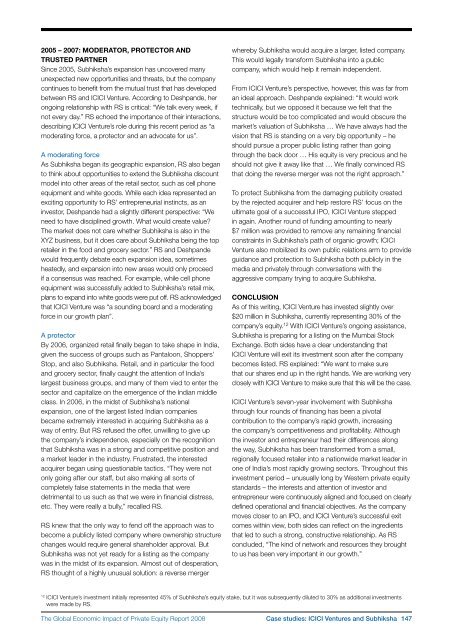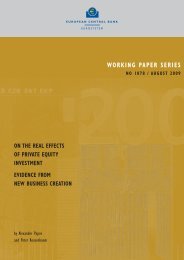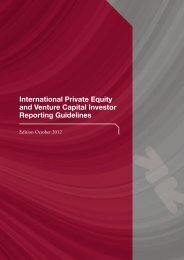2003 – 2005: patient, supportive capitalAugust 2003 marked the beginning <strong>of</strong> a new phase in therelationship between ICICI Venture and Subhiksha. At thispoint, Subhiksha had 137 stores all over Tamil Nadu, thestate surrounding Chennai, but uncertainty was mountingabout whether the company should roll out additional storesbeyond Tamil Nadu and how it could do so successfully andquickly. At the time, there was no other organized retailplayer in the food and grocery discount segment with anational presence, which posed a critical opportunity forSubhiksha to seize the first‐mover advantage. But in therace to win, time and capital were <strong>of</strong> the essence.Removing funding constraintsDuring an August 2003 board meeting, one <strong>of</strong> the members<strong>of</strong> the ICICI Venture team asked RS what constraints wereimpeding his expansion plans. His response was money andpeople, which prompted ICICI Venture to evaluate a secondround <strong>of</strong> funding that would enable the company to movemore aggressively to execute the firm’s expansion strategy.Between 2004 and 2006, ICICI Venture invested anadditional $17 million on top <strong>of</strong> the original $3.4 millioninvested in 2000, which increased the investor’s equity stakein the company to 45%. 11 But far from writing a blankcheque, ICICI Venture invested with a number <strong>of</strong> conditionsthat were designed to strengthen Subhiksha’s capabilitiesas it embarked on a major expansion, including:Investing in ITTo support Subhiksha’s national expansion and prepare thefirm for its eventual listing, one ICICI Venture condition foradditional financing was that the company strengthen itsIT and management systems. Although RS single‐handedlyinvented the management system and practices that definedSubhiksha, he initially resisted the need for an elaborateIT system. “Here is a brilliant guy who has everything in hishead. RS has no reason to put this on paper or in somes<strong>of</strong>tware programme,” explained Deshpande. “But wewanted a back‐up. A situation where all <strong>of</strong> the company’sinformation is in just one head is very risky for us asinvestors.” Finally RS was convinced and in 2006 the coreIT upgrade was completed using state‐<strong>of</strong>‐the‐art s<strong>of</strong>tware.Build a management teamBefore 2004, like many entrepreneurs, RS was a hands‐on leaderwho retained personal responsibility for overseeing all functionalareas <strong>of</strong> Subhiksha management. ICICI Venture recognized that apan‐India growth plan required a deeper management team anda less centralized approach with a greater amount <strong>of</strong> delegation<strong>of</strong> responsibilities. Thus another condition for ICICI Venture’sadditional investment was an agreement that RS would recruit anew Chief Financial Officer (CFO), a Chief Technology Officer(CTO), a logistics/back‐end head, and a number <strong>of</strong> business unitheads for each regional market.Developing a robust board structureEven RS acknowledged that before 2004, Subhiksha’s boardconsisted <strong>of</strong> “my right hand and my left hand”. ICICI Venturenot only urged him to have an independent board, but alsoone that truly reflected the pan‐Indian goals <strong>of</strong> the company.Leveraging its wide business network, ICICI Venture helpedattract a truly pan‐India board, with independent directors,industry experts and academics from across India and theUnited States. (See Exhibit 3 for Subhiksha’s boardcomposition and brief biographies <strong>of</strong> board members.) “Inever knew any <strong>of</strong> these people before at all. ICICI Venturebrought these connections to us. This greatly enhancedour credibility in the eyes <strong>of</strong> future investors,” remarked RS.Enabling a pan‐India vision and being patient and supportiveRS’s initial expansion plan was to focus on the south‐west<strong>of</strong> India, the country’s wealthiest region. ICICI Venture madeit clear, however, that it would support Subhiksha’s growthstrategy only if RS pursued a pan‐India vision that wouldtransform Subhiksha into the country’s dominant food andgrocery discounter. Deshpande argued that a south-westerncompany would be far less attractive to investors when andif Subhiksha underwent an IPO. RS was soon persuadedand in late 2003, ICICI Venture made a second roundinvestment worth $3.5 million, and Subhiksha began toexpand across India.But execution <strong>of</strong>ten deviates from original plans. AlthoughRS’s initial pan‐India rollout strategy was to sequentiallyenter each geographic market, he began to reconsider afterwitnessing the phenomenal transformation <strong>of</strong> Bharti Telecomfrom a northern India mobile company to India’s largestmobile provider. Bharti had adopted a “big bang” approach –the simultaneous rollout <strong>of</strong> service in numerous geographicmarkets. RS concluded that this more aggressive approachwould be superior to his more gradual strategy because itwould create simultaneous brand recognition across India.RS worried that ICICI Venture might not agree with the shift<strong>of</strong> strategy because it would require a time‐consumingreconfiguration <strong>of</strong> the company’s logistics and delay theexpansion. In addition, more capital would be required t<strong>of</strong>und an intensified marketing campaign. But to his surprise,ICICI Venture immediately supported the new plan, andfollowed up with a third round <strong>of</strong> financing <strong>of</strong> about$6.5 million in late 2004.Reflecting on the experience, RS said: “We wanted aninvestor who would understand what we were trying toachieve and would not second-guess us. It was reassuringthat ICICI Venture understood that we changed strategy notbecause we couldn’t deliver on the original plan, but becausethe new strategy was better. [This level <strong>of</strong> trust] was why wedidn’t even talk to any other investors.”In summary, the period from 2003 to 2005 marked thesecond stage in the ICICI Venture‐Subhiksha relationship. InRS’s own words, during this period, ICICI Venture providedthe much-needed “patient, supportive capital”, as well asmanagement support, and valuable suggestions for thecompany’s strategic direction.11This was later reduced to 30% due to additional financing.146 Case studies: ICICI Ventures and Subhiksha<strong>The</strong> <strong>Global</strong> <strong>Economic</strong> <strong>Impact</strong> <strong>of</strong> <strong>Private</strong> <strong>Equity</strong> <strong>Report</strong> <strong>2008</strong>
2005 – 2007: Moderator, protector andtrusted partnerSince 2005, Subhiksha’s expansion has uncovered manyunexpected new opportunities and threats, but the companycontinues to benefit from the mutual trust that has developedbetween RS and ICICI Venture. According to Deshpande, herongoing relationship with RS is critical: “We talk every week, ifnot every day.” RS echoed the importance <strong>of</strong> their interactions,describing ICICI Venture’s role during this recent period as “amoderating force, a protector and an advocate for us”.A moderating forceAs Subhiksha began its geographic expansion, RS also beganto think about opportunities to extend the Subhiksha discountmodel into other areas <strong>of</strong> the retail sector, such as cell phoneequipment and white goods. While each idea represented anexciting opportunity to RS’ entrepreneurial instincts, as aninvestor, Deshpande had a slightly different perspective: “Weneed to have disciplined growth. What would create value?<strong>The</strong> market does not care whether Subhiksha is also in theXYZ business, but it does care about Subhiksha being the topretailer in the food and grocery sector.” RS and Deshpandewould frequently debate each expansion idea, sometimesheatedly, and expansion into new areas would only proceedif a consensus was reached. For example, while cell phoneequipment was successfully added to Subhiksha’s retail mix,plans to expand into white goods were put <strong>of</strong>f. RS acknowledgedthat ICICI Venture was “a sounding board and a moderatingforce in our growth plan”.A protectorBy 2006, organized retail finally began to take shape in India,given the success <strong>of</strong> groups such as Pantaloon, Shoppers’Stop, and also Subhiksha. Retail, and in particular the foodand grocery sector, finally caught the attention <strong>of</strong> India’slargest business groups, and many <strong>of</strong> them vied to enter thesector and capitalize on the emergence <strong>of</strong> the Indian middleclass. In 2006, in the midst <strong>of</strong> Subhiksha’s nationalexpansion, one <strong>of</strong> the largest listed Indian companiesbecame extremely interested in acquiring Subhiksha as away <strong>of</strong> entry. But RS refused the <strong>of</strong>fer, unwilling to give upthe company’s independence, especially on the recognitionthat Subhiksha was in a strong and competitive position anda market leader in the industry. Frustrated, the interestedacquirer began using questionable tactics. “<strong>The</strong>y were notonly going after our staff, but also making all sorts <strong>of</strong>completely false statements in the media that weredetrimental to us such as that we were in financial distress,etc. <strong>The</strong>y were really a bully,” recalled RS.RS knew that the only way to fend <strong>of</strong>f the approach was tobecome a publicly listed company where ownership structurechanges would require general shareholder approval. ButSubhiksha was not yet ready for a listing as the companywas in the midst <strong>of</strong> its expansion. Almost out <strong>of</strong> desperation,RS thought <strong>of</strong> a highly unusual solution: a reverse mergerwhereby Subhiksha would acquire a larger, listed company.This would legally transform Subhiksha into a publiccompany, which would help it remain independent.From ICICI Venture’s perspective, however, this was far froman ideal approach. Deshpande explained: “It would worktechnically, but we opposed it because we felt that thestructure would be too complicated and would obscure themarket’s valuation <strong>of</strong> Subhiksha … We have always had thevision that RS is standing on a very big opportunity – heshould pursue a proper public listing rather than goingthrough the back door … His equity is very precious and heshould not give it away like that … We finally convinced RSthat doing the reverse merger was not the right approach.”To protect Subhiksha from the damaging publicity createdby the rejected acquirer and help restore RS’ focus on theultimate goal <strong>of</strong> a successful IPO, ICICI Venture steppedin again. Another round <strong>of</strong> funding amounting to nearly$7 million was provided to remove any remaining financialconstraints in Subhiksha’s path <strong>of</strong> organic growth; ICICIVenture also mobilized its own public relations arm to provideguidance and protection to Subhiksha both publicly in themedia and privately through conversations with theaggressive company trying to acquire Subhiksha.ConclusionAs <strong>of</strong> this writing, ICICI Venture has invested slightly over$20 million in Subhiksha, currently representing 30% <strong>of</strong> thecompany’s equity. 12 With ICICI Venture’s ongoing assistance,Subhiksha is preparing for a listing on the Mumbai StockExchange. Both sides have a clear understanding thatICICI Venture will exit its investment soon after the companybecomes listed. RS explained: “We want to make surethat our shares end up in the right hands. We are working veryclosely with ICICI Venture to make sure that this will be the case.ICICI Venture’s seven‐year involvement with Subhikshathrough four rounds <strong>of</strong> financing has been a pivotalcontribution to the company’s rapid growth, increasingthe company’s competitiveness and pr<strong>of</strong>itability. Althoughthe investor and entrepreneur had their differences alongthe way, Subhiksha has been transformed from a small,regionally focused retailer into a nationwide market leader inone <strong>of</strong> India’s most rapidly growing sectors. Throughout thisinvestment period – unusually long by Western private equitystandards – the interests and attention <strong>of</strong> investor andentrepreneur were continuously aligned and focused on clearlydefined operational and financial objectives. As the companymoves closer to an IPO, and ICICI Venture’s successful exitcomes within view, both sides can reflect on the ingredientsthat led to such a strong, constructive relationship. As RSconcluded, “<strong>The</strong> kind <strong>of</strong> network and resources they broughtto us has been very important in our growth.”12ICICI Venture’s investment initially represented 45% <strong>of</strong> Subhiksha’s equity stake, but it was subsequently diluted to 30% as additional investmentswere made by RS.<strong>The</strong> <strong>Global</strong> <strong>Economic</strong> <strong>Impact</strong> <strong>of</strong> <strong>Private</strong> <strong>Equity</strong> <strong>Report</strong> <strong>2008</strong> Case studies: ICICI Ventures and Subhiksha 147
- Page 2 and 3:
The Globalization of Alternative In
- Page 5:
ContributorsCo-editorsAnuradha Guru
- Page 9 and 10:
PrefaceKevin SteinbergChief Operati
- Page 11 and 12:
Letter on behalf of the Advisory Bo
- Page 13 and 14:
Executive summaryJosh lernerHarvard
- Page 15 and 16:
• Private equity-backed companies
- Page 17 and 18:
C. Indian casesThe two India cases,
- Page 19 and 20:
Part 1Large-sample studiesThe Globa
- Page 21 and 22:
The new demography of private equit
- Page 23 and 24:
among US publicly traded firms, it
- Page 25 and 26:
should be fairly complete. While th
- Page 27 and 28:
according to Moody’s (Hamilton et
- Page 29 and 30:
draining public markets of firms. I
- Page 31 and 32:
FIguresFigure 1A: LBO transactions
- Page 33 and 34:
TablesTable 1: Capital IQ 1980s cov
- Page 35 and 36:
Table 2: Magnitude and growth of LB
- Page 37 and 38:
Table 4: Exits of individual LBO tr
- Page 39 and 40:
Table 6: Determinants of exit succe
- Page 41 and 42:
Table 7: Ultimate staying power of
- Page 43 and 44:
Appendix 1: Imputed enterprise valu
- Page 45 and 46:
Private equity and long-run investm
- Page 47 and 48:
alternative names associated with t
- Page 49 and 50:
4. Finally, we explore whether firm
- Page 51 and 52:
When we estimate these regressions,
- Page 53 and 54:
cutting back on the number of filin
- Page 55 and 56:
Table 1: Summary statisticsPanel D:
- Page 57 and 58:
Table 4: Relative citation intensit
- Page 59 and 60:
figuresFigure 1: Number of private
- Page 61 and 62:
Private equity and employment*steve
- Page 63 and 64:
Especially when taken together, our
- Page 65 and 66:
centred on the transaction year ide
- Page 67 and 68:
and Vartia 1985.) Aggregate employm
- Page 69 and 70:
sectors. In Retail Trade, the cumul
- Page 71 and 72:
employment-weighted acquisition rat
- Page 73 and 74:
FIguresFigure 1: Matches of private
- Page 75 and 76:
Figure 6:Figure 6A: Comparison of n
- Page 77 and 78:
Figure 8:Figure 8A: Comparison of j
- Page 79 and 80:
Figure 11: Variation in impact in e
- Page 81 and 82:
Figure 12: Differences in impact on
- Page 83 and 84:
Private equity and corporate govern
- Page 85 and 86:
et al (2007) track the evolution of
- Page 87 and 88:
groups aim to improve firm performa
- Page 89 and 90:
distribution of the LBO sponsors, m
- Page 91 and 92:
the most difficult cases. This stor
- Page 93 and 94:
to see whether these changes of CEO
- Page 95 and 96:
Figure 3:This figure represents the
- Page 97 and 98:
TablesTable 1: Company size descrip
- Page 99 and 100:
Table 5: Changes in the board size,
- Page 101 and 102:
Table 7: Board turnoverPanel A: Siz
- Page 103 and 104:
Part 2Case studiesThe Global Econom
- Page 105 and 106:
European private equity cases: intr
- Page 107 and 108:
Exhibit 1: Private equity fund size
- Page 109 and 110:
Messer Griesheimann-kristin achleit
- Page 111 and 112:
ealized it was not possible to grow
- Page 113 and 114: The deal with Allianz Capital partn
- Page 115 and 116: the deal, the private equity invest
- Page 117 and 118: Exhibit 1: The Messer Griesheim dea
- Page 119 and 120: Exhibit 5: Post buyout structureMes
- Page 121 and 122: New Lookann-kristin achleitnerTechn
- Page 123 and 124: feet. This restricted store space w
- Page 125 and 126: institutional investors why this in
- Page 127 and 128: Although a public listing did not a
- Page 129 and 130: Exhibit 5: Employment development a
- Page 131 and 132: Chinese private equity cases: intro
- Page 133 and 134: Hony Capital and China Glass Holdin
- Page 135 and 136: Hony’s Chinese name means ambitio
- Page 137 and 138: Establishing early agreement on pos
- Page 139 and 140: Executing the IPOEach of the initia
- Page 141 and 142: Exhibit 1A: Summary of Hony Capital
- Page 143 and 144: Exhibit 4: Members of the China Gla
- Page 145 and 146: Exhibit 6A: China Glass post‐acqu
- Page 147 and 148: Exhibit 8: China Glass stock price
- Page 149 and 150: 3i Group plc and Little Sheep*Lily
- Page 151 and 152: y an aggressive franchise strategy,
- Page 153 and 154: soul” of the business. But there
- Page 155 and 156: Exhibit 1: Summary information on 3
- Page 157 and 158: Exhibit 6: An excerpt from the 180-
- Page 159 and 160: Indian private equity cases: introd
- Page 161 and 162: ICICI Venture and Subhiksha *Lily F
- Page 163: investment,” recalled Deshpande.
- Page 167 and 168: Exhibit 3: Subhiksha’s board comp
- Page 169 and 170: Warburg Pincus and Bharti Tele‐Ve
- Page 171 and 172: founded two companies at this time
- Page 173 and 174: By 2003 this restructuring task was
- Page 175 and 176: Exhibit 1C: Private equity investme
- Page 177 and 178: Exhibit 4B: Bharti cellular footpri
- Page 179 and 180: Exhibit 6: Summary of Bharti’s fi
- Page 181 and 182: Exhibit 7: Bharti’s board structu
- Page 183 and 184: In the 1993‐94 academic year, he
- Page 185 and 186: consumer products. She was also a R
- Page 187 and 188: AcknowledgementsJosh LernerHarvard
- Page 189: The World Economic Forum is an inde















